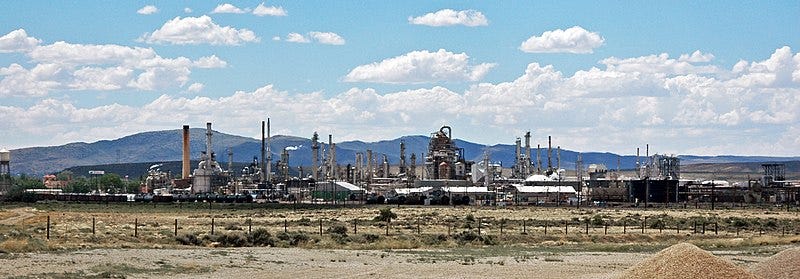As COP28 Reaches a Controversial End, Where Do Robert F. Kennedy Jr.’s Climate Solutions Fit In?
By Gary Wockner, Special to The Kennedy Beacon
By Gary Wockner, Special to The Kennedy Beacon
As the 28th United Nations Climate Change Conference, known as COP28, wound down in Dubai on Wednesday, December 13, most of the delegates reached a final consensus agreement about how the world needs to “transition away from fossil fuels.” This agreement seemed to brighten the dark mood that had hovered over the entire conference, both before and during the meeting.
Environmental advocates in the United States and across the planet had been vocally protesting the conference, not only because it was being held in Dubai, a leading oil-producing country, but because the man appointed to oversee COP28 as conference president was Sultan al-Jaber, who is also the president of the Abu Dhabi National Oil Company.
Former US vice president Al Gore weighed in heavily before, during, and at the end of the conference. Reporting in November, just before COP28 began, Politico quoted Gore’s remarks in a TED Talk this past August, in which he referred to al-Jaber’s leadership role “as evidence that the fossil fuel industry has ‘brazenly seized control of the COP process’” and proclaimed, “I think it’s time to say, wait a minute, do you take us for fools? Do you think you can just completely remove the disguise and we won’t notice?”
As the conference was nearing its end and it appeared that no agreement was going to be reached on phasing out fossil fuels, Gore let it rip on X: “COP28 is now on the verge of complete failure. The world desperately needs to phase out fossil fuels as quickly as possible, but this obsequious draft reads as if OPEC dictated it word for word. It is even worse than many had feared. It is ‘Of the Petrostates, By the Petrostates and For the Petrostates.’ It is deeply offensive to all who have taken this process seriously.”

And then, as COP28 came to an end and an agreement was reached to “transition” away from fossil fuels, Gore posted on X: “The decision at #COP28 to finally recognize that the climate crisis is, at its heart, a fossil fuel crisis is an important milestone. But it is also the bare minimum we need and is long overdue. The influence of petrostates is still evident in the half measures and loopholes included in the final agreement.”
While Gore displayed a bit of optimism about COP28’s outcome, other environmental advocates, as well as delegates from island nations, were less forgiving. Anne Rasmussen, the delegate from the island nation of Samoa, was quoted in The Guardian as saying the agreement contained a “litany of loopholes.” Jean Su, the energy justice director at the Center for Biological Diversity, was quoted by CNN as saying those loopholes were “cavernous.” And Nina Lakhani, a climate justice reporter for The Guardian, posted on X: “Global south, Indigenous peoples & frontline communities overwhelmingly outraged” by the agreement.
Amid the chaos and fallout at COP28, it’s worthwhile to take another look at US presidential candidate Robert F. Kennedy Jr.’s proposed policies on climate change and his climate solutions.
First and foremost, Kennedy is laying the groundwork for finding agreement amid the highly discordant politics in the United States. As a candidate, he has repeatedly discussed “unity” rather than using the more polarizing rhetoric that plagues the climate change issue. I speculate that if Kennedy were president, he would find some common ground with the statements of US Climate Envoy John Kerry, who was quoted in The New York Times as saying about the agreement reached at COP28 that “this is a moment where multilateralism has come together and people have taken individual interests and attempted to define the common good. That is hard, it’s the hardest thing in diplomacy, it’s the hardest thing in politics.”
Second, while much of the focus at the conference was on the transition away from fossil fuels, there were some helpful language and outcomes around the role of so-called “nature-based climate solutions,” which Kennedy has loudly supported. A Newsweek story titled “COP28 Looks to Nature for Help Against Climate Change” discusses these solutions and quotes from a leading voice in the nature-based movement, Brian O’Donnell, director of Campaign for Nature. The president and CEO of the Wildlife Conservation Society, Monica Medina, is probably the leading global voice on this issue with a platform at COP28. In an interview, she tells the story of how “nature is both good for mitigation and great for adaptation.” Kennedy has made nature-based solutions a main policy principle of his campaign by repeatedly speaking about solutions that “protect our health, our farmland, our waterways, our forests, and our wildlife in ways that help the climate, too.”
Third, Kennedy has come out strongly against so-called “carbon capture and storage” (CCS), including the pipelines that would carry gasified carbon dioxide across the US to be injected underground and buried. In a sharply worded opinion piece in Newsweek, Kennedy called these schemes a “boondoggle for big oil,” and he’s traveled around Iowa telling this story at his events. At COP28, a significant number of advocates and delegates spoke against CCS (carbon, capture and storage) – in fact, the entire fracas at the conference was around whether oil-producing countries would get away with simply promoting and supporting CCS rather than actually cutting back on the production and burning of fossil fuels. The Guardian reported that “at least 475 carbon-capture lobbyists” attended COP28.
Fourth, it has flown under the radar, but several months ago, Kennedy came out in support of a gradual phase-out of “fracking” in the US. Fracking is a process that injects highly pressurized liquid into underground rock formations to break them apart so that oil and gas can be pumped to the surface more easily. The Independent Petroleum Association of America reports that “more than 1.7 million U.S. wells have been completed using the fracking process, producing more than seven billion barrels of oil and 600 trillion cubic feet of natural gas.” Further, The Guardian reports that the ongoing “US fracking boom could tip [the] world to [the] edge of climate disaster.” Thus, Kennedy’s policy to phase out fracking would surely make a difference in the amount of fossil fuels burned in the future, the contention over which was the major sticking point in reaching the agreement at COP28.
Finally, Kennedy has repeatedly spoken about ending the multi-trillion-dollar subsidies given to the global fossil fuel industry every year, a point completely avoided at COP28. In August 2023, the International Monetary Fund reported that “Fossil Fuel Subsidies Surged to Record $7 Trillion” and argued that “scaling back subsidies would reduce air pollution, generate revenue, and make a major contribution to slowing climate change.” While the COP certainly broke new ground discussing the transition away from fossil fuels, Kennedy so far appears to be one of the few main voices talking about ending the subsidies.

It’s on these last two points that the comparison between President Biden and Kennedy seems starkest. Promoting oil and gas has been a truly bipartisan love affair for the last three presidents – Obama, Trump, and Biden – and finally the United States is now the biggest oil-producing country on the planet, by far. Right before COP28, The New York Times reported that US oil producers were “cranking out a record 13.2 million barrels a day, more than Russia or Saudi Arabia. The flow of oil has grown by roughly 800,000 barrels a day since early 2022, and analysts expect the industry to add another 500,000 barrels a day next year.”
In fact, in the lead-up to COP28, Reuters reported, “Record US oil output challenges Saudi mastery,” as if there were really a contest and it’s great that the US is now winning it. Even the mainstream environmental organization Earthjustice this week reported in its “Biden Admin’s Climate Scorecard” that the administration had made “little/no progress” in its goal to “accelerate the transition away from fossil fuels.” Further, the administration’s support of the Willow Project in Alaska has caused epic environmental battles in the US, as has its support for “hundreds of new oil and gas projects.” It appears that Biden is accelerating the climate crisis through record oil production, while Kennedy has a plan to decelerate it.
Given the fallout from the general failure at COP28 to make a true dent in the climate crisis, I believe that Kennedy’s policies need to be taken seriously on the global stage as well as in the US presidential election. A climate-solutions platform that unifies rather than divides, focuses on nature-based solutions, deplatforms schemes like CCS, and truly cuts fossil fuel subsidies and production has to be front and center in 2024.
***
Gary Wockner, PhD, is a leading global river-protection advocate. His opinions above are solely his own and do not represent any organization or company he is affiliated with. Contact: Gary@GaryWockner.com









We need to take a nuanced view. After much study and contemplation and
above all seeing the actual MATH (below), I've come to he conclusion
that we have an ecological crisis, NOT a CO2 crisis. Causes of the
crisis are (among others)
1. aerial spraying of toxic stuff
2. rainforest devastation in pursuit of corporate profits
3. desertification of large areas of the planet caused in part by human activity
4. plastics articles and "forever chemicals"
5. unregulated sewage disposals
6. industrial pollution from many sources
7. wildlife extinctions and threats of extinction
8. monocrop agriculture
9. military contamination, like toxic pits and depleted uranium
NOW for the math,and this is what really turned me around!
Current measurements show around 425 parts per million CO2 in our
atmosphere and it is proposed that we need to achieve 350 PPM
425 divided by a million is .000425 (tiny)
350 divided by a million is .000350 (tiny)
The difference is .000075 or .0075% (MINUSCULE)
By contrast, oxygen is something like 21% if I recall correctly.
The real scam is making CO2 the scapegoat (or "patsy" as Oswald
said correctly about himself). The have the wrong target! On purpose!
One more distraction from the real problems for livability (see
above). Jon
The green-house effect (effect of certain gases in the Earth's atmosphere allowing sunlight to penetrate but then trapping the resulting heat from dissipating out of the atmosphere) is a phenomenon of physics. I understand that Al Gore and Greta Thunberg are well-versed in the science of physics, but I'm wondering if RFK Jr might *also* listen to the opinions of actual physicists. John Clauser, awarded a Nobel Prize in Physics for his work, might be a person who could help educate Mr. Kennedy.
The problem with listening to the (highly censored) opinions of physicists is that many of them, like Dr. Clauser, believe that carbon in the atmosphere has *no* significant impact on climate change. That opinion (most likely a fact, as well as an opinion) does pose a problem for the millions of climate lunatics like Gore and Greta (let's simplify, and call them Greta Gore).
Bobby, please wake up!